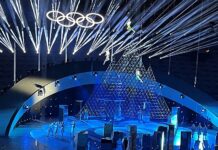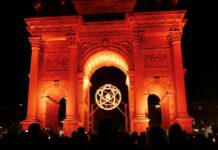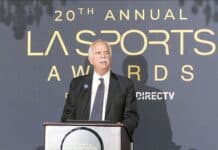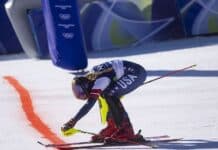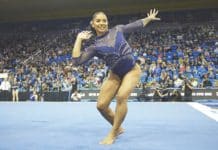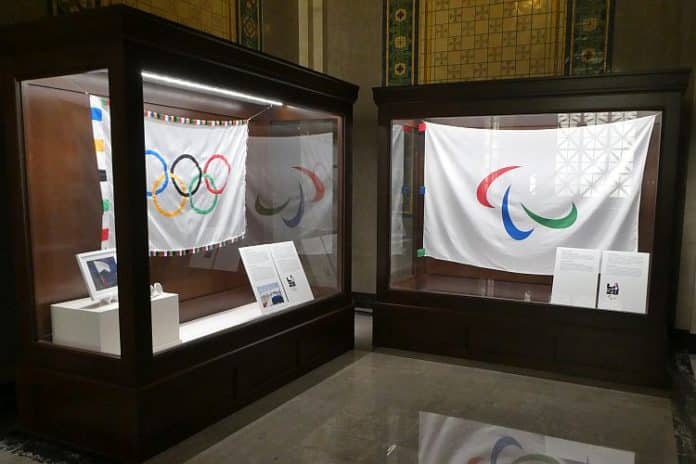★ The Sports Examiner: Chronicling the key competitive, economic and political forces shaping elite sport and the Olympic Movement.★
★ To get the daily Sports Examiner Recap by e-mail: sign up here! ★
≡ INTEL REPORT ≡
While the headlines around Los Angeles City Hall and the 2028 Olympic and Paralympic Games have mostly been about the $2.6 billion Los Angeles Convention Center expansion project, the City Council has been continuing the quiet work to ensure that the LA28 organizers can get their work done efficiently.
Last Wednesday, the City Council passed, by 14-0, a motion to enable the City’s Bureau of Engineering to figure out how to help LA28 by holding down construction activity in areas where the 2028 Games might be impacted:
● “DIRECT the Bureau of Engineering (BOE), in consultation with the Department of Transportation (DOT) and other City agencies, as needed, to establish and implement the 2028 Games Construction Moratorium, including its duration, boundaries, and exemptions.”
● “DIRECT the BOE to apply the 2028 Games Construction Moratorium onto any applicable permits issued for construction activities in the public right of way.”
● “DIRECT the BOE, DOT, [Bureau of Street Services], Department of Water and Power, and all other City construction and maintenance agencies to limit non-emergency construction activities to be consistent with the 2028 Games Construction Moratorium.”
● “DIRECT the BSS to implement a moratorium on special events within the 2028 Games Construction Moratorium area, with exemptions available for Games-related events and other special events that do not impact Games preparations or operations.”
This is a significant step by the City Council and will have real-world impacts in 2028. The next step is to be sure that this moratorium is enforced. So, the City Council directed:
“[T]he City Attorney, in consultation with the Office of Major Events, Department of Building and Safety (DBS), Los Angeles Police Department (LAPD), Department of City Planning (DCP), Board of Public Works, BOE, Bureau of Street Services (BSS), Bureau of Contract Administration (BCA), DOT, and any other relevant department, to prepare and present an ordinance imposing additional restrictions on construction activities that may impact the Games operations or experience within the 2028 Games Construction Moratorium boundaries, including but not limited to haul routes, noise levels, dust control, site runoff control, traffic, and parking, as necessary and appropriate.”
There will be exceptions, of course, for emergency services and operations, and an amendment was inserted late into the motion last week to exempt the fire-rebuilding efforts in the Pacific Palisades from any impact of the moratorium. Only one Olympic venue, Riviera Country Club – the site for golf – is near the fire zone and was not damaged.
However, the spread of the moratorium is likely to be well beyond the competition venues. City Engineer Ted Allen, in an April memo, explained an existing model – the Holiday Moratorium – that will be a model:
“The Holiday Moratorium is an annual restriction on permits for construction activities on certain public streets during the holiday season, in an attempt to minimize impacts on shoppers and retail businesses. Early notices are issued to all stakeholders, including utility companies, other users of the public right of way, and operators of public facilities, that certain streets should not be disrupted by construction activities during specific dates.”
As to the impacted sites and streets:
“BOE [Bureau of Engineering] will work with partner agencies to define 2028 Games impact zones where restrictions are necessary and appropriate, including a perimeter around each event venue, as well as the Games Route Network and other critical venue access routes. BOE may also include other areas with high visitation or visibility, such as major tourist destinations, hospitality locations, Cultural Olympiad sites, or remote fan zone locations.
“Given that event operational needs are still being determined, BOE will begin planning for potential impact zones that can be refined over time. BOE also anticipates that some activities may need to be restricted for a longer period of time closer to the event venues, with lighter restrictions in other areas. BOE’s overall objective is to support the operational needs of the Games while minimizing disruption to public and private infrastructure projects.”
So, next up will be a draft ordinance for the Council to review.
¶
The flip side of the building moratorium is to allow the LA28 organizers to obtain permits for their construction needs in an efficient manner. A motion to speed up the process was originally introduced back in December 2024:
“Without action by the Council, certain elements of the 2028 Games could face significant delays due to compliance with existing City Planning approvals and zoning regulations, including but not limited to Conditional Use Permits (CUPs), Site Plan Review, height restrictions, setbacks, and specific plan limitations.
“It is in the best interest of the City and its residents to expedite the creation of the necessary infrastructure to host the 2028 Games while ensuring that these developments are in alignment with the overall vision of a sustainable, accessible, and world-class event.”
What this will mean in practice was spelled out:
● “The City cannot afford any delays in the approval process for the 2028 Games infrastructure, and these approvals must be expedited to ensure that Los Angeles is fully prepared to host the 2028Games on time.
“The City therefore should grant exemptions for all Olympic and Paralympic temporary and permanent venues, training facilities, security perimeters, broadcast and media centers, transit infrastructure, live sites and fan zones, and associated structures from the requirements of City Planning approvals, zoning regulations, and permitting processes, including but not limited to: Conditional Use Permits (CUPs) and conditions tied to such permits, Site Plan Review requirements, height restrictions, setback requirements, limitations imposed by specific plans, and any other planning or zoning regulations that could delay or impede the rapid construction and deployment of essential facilities.”
● “This approach is consistent with actions taken by the City of Los Angeles during the 1984 Olympic Games, where similar exemptions were granted to ensure the swift construction of the necessary infrastructure and venues. This ordinance should utilize the CEQA [California Environmental Quality Act] exemptions provided in state law for Olympic-related infrastructure, ensuring that the City can effectively expedite the environmental review process and avoid unnecessary delays while complying with state requirements for environmental protection.”
A state law passed to assist the 1984 Olympic Games in Los Angeles is still on the books as California Code of Regulations Title 14 Statutory Exemption Section 15272- Olympic Games, including “CEQA does not apply to activities or approvals necessary to the bidding for, hosting or staging of, and funding or carrying out of, Olympic Games.”
This motion has been the subject of considerable discussion and concern about community groups, having nothing to do with the LA28 Games, but other projects that could be approved under this umbrella, for example, the controversial Union Station-to-Dodger Stadium “gondola.”
The L.A. City Planning Department provided a 51-page review of the motion concept and a proposed ordinance on 24 September 2025, which was amended by the City Council’s Planning and Lane Use Management committee on 30 September and forwarded to the full City Council. The Council’s Ad Hoc Committee on the 2028 Olympic and Paralympic Games waived consideration.
The item is slated for the City Council meeting on Tuesday, 7 October.
Taken together, these two ordinances will be of considerable assistance to LA28’s efforts to plan and proceed with its needed construction projects to get the 2028 Games ready for prime time. But it will also be noted by watchdogs to see if the CEQA exemption – especially – is used for something other than the intended Olympic and Paralympic uses.
¶
★ Receive our exclusive, weekday TSX Recap by e-mail by clicking here.
★ Sign up a friend to receive the TSX Recap by clicking here.
★ Please consider a donation here to keep this site going.
For our updated, 699-event International Sports Calendar for 2025, 2026 and beyond, by date and by sport, click here!











